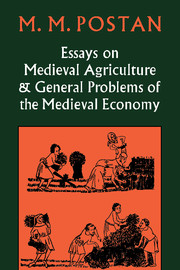Book contents
- Frontmatter
- Preface
- Acknowledgements
- Contents
- I GENERAL
- II AGRARIAN
- 7 The chronology of labour services
- 8 The charters of the villeins
- 9 Heriots and prices on Winchester manors with statistical notes on Winchester heriots by J. Longde (Graphs appear between pp. 174 and 175)
- 10 Some agrarian evidence of a declining population in the later Middle Ages
- 11 Village livestock in the thirteenth century
- 12 Glastonbury estates in the twelfth century
- 13 Legal status and economic condition in medieval villages
- Index
- Plate section
13 - Legal status and economic condition in medieval villages
Published online by Cambridge University Press: 05 November 2011
- Frontmatter
- Preface
- Acknowledgements
- Contents
- I GENERAL
- II AGRARIAN
- 7 The chronology of labour services
- 8 The charters of the villeins
- 9 Heriots and prices on Winchester manors with statistical notes on Winchester heriots by J. Longde (Graphs appear between pp. 174 and 175)
- 10 Some agrarian evidence of a declining population in the later Middle Ages
- 11 Village livestock in the thirteenth century
- 12 Glastonbury estates in the twelfth century
- 13 Legal status and economic condition in medieval villages
- Index
- Plate section
Summary
In drawing the distinction between different layers of medieval village society we must guard ourselves against using the term ‘classes’ in a sense in which it is commonly employed in sociological discussion and in everyday discourse. Even in these discussions it is now generally admitted that in most periods of European history frontiers between classes have been neither permanent nor impassable, and that in the most class-ridden societies the frontiers have shifted from time to time and have at all times been crossed and recrossed by individuals. More impermanent still, and certainly much fainter than most of the observable class distinctions, were the demarcations between social groupings in the medieval village – indeed so faint were they that historians will justly hesitate to describe them as those of class.
Uncertain as the definition of social class is, it is commonly taken to apply to groups largely self-contained as regards social intercourse and inter-marriage and clearly marked off from each other by enduring differences of wealth or by unequal shares of power in state and society. In these respects English medieval society taken as a whole was far from classless. Few other societies have known such profound differences of status, wealth and authority and such impenetrable barriers to social intercourse as those which divided the top rank of the feudal order from other men and more especially from the great mass of villagers.
- Type
- Chapter
- Information
- Publisher: Cambridge University PressPrint publication year: 1973



